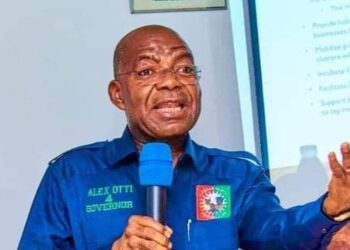Chamba Simeh
Immediate past Minister of Information, Mr Labaran Maku, is obviously licking his wounds by now. Maku, an aspirant in Nasarawa state, was handed the bitter pill of electoral defeat at Monday’s governorship primaries of the Peoples Democratic Party (PDP). The consolation, however, for the Jonathan administration’s erstwhile loquacious minister or talkative-in-chief is the fact that he did not go down alone. His colleagues at the federal cabinet who quit at the same time with Maku to gun for their respective state government houses, notably, Professor Onyebuchi Chukwu of the health ministry (Ebonyi), Mr Emeka Wogu of labour (Abia), and Musiliu Obanikoro, former minister of state, defence (Lagos) also had their ambition blown up at the gate of the electioneering process – party primaries. Maku, a former deputy governor of Nasarawa state, lost the primary to Mohammed Yusuf Agabi, a businessman and educationist. Chairman of the Electoral Committee, Senator Adolphus Wabara, stated that Yusuf Agabi polled 214 votes to defeat Maku and former Governor Aliyu Doma, who polled 160 and 129 votes, respectively.
Maku’s political adventure had elicited much interest and awe owing to his antecedent as a student union activist. His youthful activism and exuberance had given the lie of a progressive in the making. But this was not to be as the lure of power led to a tacit-turn that saw Maku pitching his tent with the aristocratic and conservative ruling class. Worse still, Maku played the ignoble role of a trumpeter of falsehood in a regime that was clearly missing the mark in the delivery of the dividends of democracy. His controversial pet project, the Good Governance Tour, was riddled with corruption and falsehood so much so that the assessment of states was based on the concepts of patrimonalism and prebendalism.
Maku, who was the president of the Student Union Government (SUG) of the University of Jos in 1988, had led a team of students on a riot against the then military president Ibrahim Babangida’s planned removal of petroleum subsidy. He termed it “a crime against the Nigerian masses and a war against the poor”. But having become the minister of information 23 years after that affront Maku made a dramatic volte face when confronted by the same situation of a mass labour protest against the almost 300 per cent hike in the price of petroleum products. Apparently not oblivious of his earlier radical posture on the oily affair, Maku said in 2011 that “the removal of fuel subsidy is long overdue”.
This trait of inconsistency and lack of principles may have prompted Senate President David Mark’s remark that “the information minister is just a careless talker. He is extremely careless”. Mark’s observation was in reaction to Maku’s statement to the effect that the National Assembly resolutions had no binding force but were merely persuasive. This was in reference to the resolution of the federal legislature asking the Central Bank of Nigeria (CBN) to suspend the printing of N5,000 note as well its proposed conversion of N5, N10, and N20 notes to coins. Maku, who was compelled to recant, after the senate committee on information and media presented him with a graphic effect of its resolutions, had already ridiculed himself and probably embarrassed his master, President Jonathan.
The committee had reminded Maku that the doctrine of necessity which led to the emergence of the then Vice President Goodluck Jonathan as acting president in February 2010 was passed into resolutions by the Senate and House of Representatives. A constitutional logjam had been created by the non-transmission of a letter to the vice president to act following the hospitalization of then President Umaru Musa Yar’Adua in Saudi Arabia. Maku’s memory was refreshed to the essence that these resolutions enabled Jonathan ascending the office of President on the demise of Yar’Adua, noting that Maku’s appointment as minister came through by a resolution passed by the Senate.
The violent communal and political conflicts in his home state of Nasarawa, which led to the death of scores of people, are linked to Maku’s ambition to unseat the incumbent administration of Alhaji Umaru Tanko Al-Makura in order to pave the way for him (Maku) to be the governor of the state. Having received the flak from the PDP for being responsible for the fall of Nasarawa state to the Congress for Progressives Change (CPC), now the All Progressives Congress (APC), Maku seems to have put spanners in the works to make the state ungovernable for Al-Makura. But the resilient, hard-working, and visionary Governor Al-Makura has defied all odds against his blueprint to step up the development ante of Nasarawa state. This explains the governor’s easy ride to clinch his party’s second term ticket while his detractors are roundly rejected even at the poll of first instance.
The upstage of some supposedly “anointed” godsons of incumbent executives at both the federal and state levels at the parties’ primaries is a pointer to the paradigm change Nigerians should expect in the 2015 general election, devoid of irregularities. Political office holders who have refused to shape up will be shipped out.



